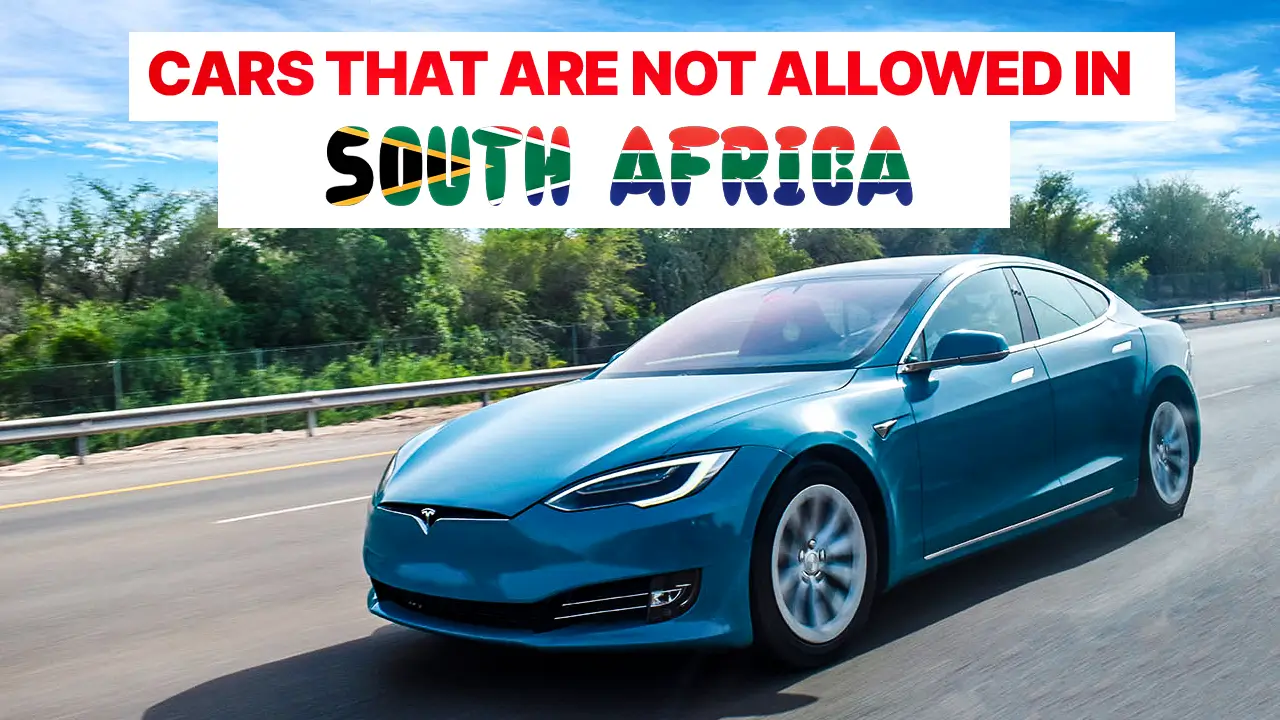South Africa’s automotive sector is strictly regulated to maintain safety, environmental standards, and protection for domestic manufacturers. Rules control the importation, registration, and use of automobiles. As a result, some car models are not allowed in the nation. Economic policies, environmental concerns, and safety rules are some variables that affect these limitations.
Cars Banned in South Africa: What You Need to Know
Second-Hand Imports
In South Africa, the ban on importing used cars for personal use is one of the most noticeable regulations. The local automobile sector is a major employer and contributor to the economy. The government enforces this legislation to safeguard it. Only the following are exempt:
- Special permits for returning residents bringing personal vehicles.
- Classic or vintage cars (over 40 years old).
- Inherited vehicles, subject to approval.
Second-hand vehicle imports can undermine the local industry by creating competition for locally manufactured or assembled vehicles. They also pose a risk to road safety, as some may not meet South African safety standards.
Vehicles Without Compliance with Safety Standards
The South African Bureau of Standards (SABS) enforces strict for vehicles. Any car that does not meet these standards cannot be legally imported or registered.
- Crashworthiness: Vehicles must pass crash tests to ensure passenger safety.
- Seatbelts and airbags: Non-compliance with regulations regarding safety equipment renders a vehicle illegal.
Vehicles from some regions, such as parts of Asia or South America, might not meet these safety standards due to differing regulations in their countries of origin.
Vehicles Without Environmental Compliance
To limit emissions and lessen the impact of automobiles on the environment, South Africa enforces environmental regulations. Vehicles that do not meet these requirements are not allowed.
- Euro Emission Standards: Imported cars must meet a specific level of compliance, similar to Euro 4 or higher, depending on the region.
- Diesel Regulations: Vehicles with older diesel engines that produce excessive emissions are prohibited.
These measures align with global efforts to combat climate change and reduce air pollution.
Right-Hand Drive Restrictions
Right-hand drive (RHD) is the system used in South Africa. In general, cars with left-hand drive (LHD) systems are not allowed unless for reasons such as:
- Vintage or classic cars.
Specialized vehicles used in regulated conditions (building, mining, etc.).
Because they don’t fit in with the local driving infrastructure and traffic flow, LHD automobiles are deemed dangerous on South African roads.
Stolen or Illegally Imported Cars
South Africa has stringent measures to prevent the entry of stolen vehicles or cars illegally imported from other countries. These include:
- Cross-border vehicle clearance processes.
- Verification of ownership documents and VIN (Vehicle Identification Numbers).
Illegally imported cars are confiscated and often destroyed to deter smuggling and ensure compliance with international agreements.
Vehicles with Tampered Odometers or VINs
VINs and tampered odometers are warning signs of possible theft or fraud. In South Africa, such cars are not allowed to be registered. To preserve the integrity of the automobile market, import authorities and vehicle inspectors closely examine these factors.
High-Performance Vehicles Without Modifications
Sports cars and supercars are high-performance vehicles that might be prohibited if they don’t adhere to municipal regulations. These consist of:
• Engine or exhaust system noise limits.
• Regulations of emissions.
Before their import, some cars might need to be modified to meet South African regulations.
Rebuilt or Salvage Vehicles
Known as “write-offs,” rebuilt or salvaged cars are illegal in South Africa unless they pass rigorous examinations and satisfy roadworthiness standards. Even Nevertheless, import restrictions are strict because they could be dangerous. Reasons for Restrictions
- Audi GT50 Concept: A Loud Reminder of Why Car Enthusiasts Fell in Love With Audi
- Nearly 30% of UK Drivers Believe Car Tax Should Be Based on Mileage — Survey
- Why Planes and Boats Escaped the Luxury Tax But Cars Didn’t
- Australia’s Headlight Confusion: Authorities Warn Drivers After Viral $250 Headlight Rule Goes Wild Online
- 2025 Hyundai Venue Facelift Launched in India – Full Details, Variants, and Price
The primary reasons behind these regulations include:
- Safety: Ensuring that vehicles on South African roads meet high safety standards.
- Economic Protection: Supporting the local automotive industry by limiting competition from cheap imports.
- Environmental Responsibility: Reducing the carbon footprint and air pollution caused by outdated vehicles.
- Consumer Protection: Preventing fraudulent practices involving tampered or stolen cars.
Conclusion
Safety, the environment, and the economy are the main drivers of South Africa’s strict import laws. Although there are a few exceptions, most cars that don’t fit local regulations are dangerous, damaging to the environment, or disruptive to the economy are not allowed.
